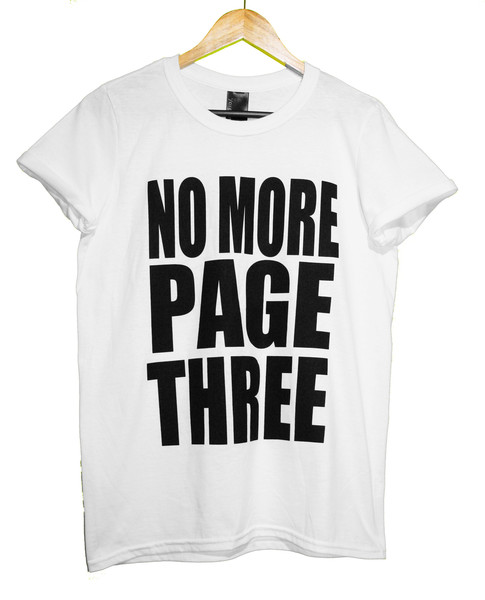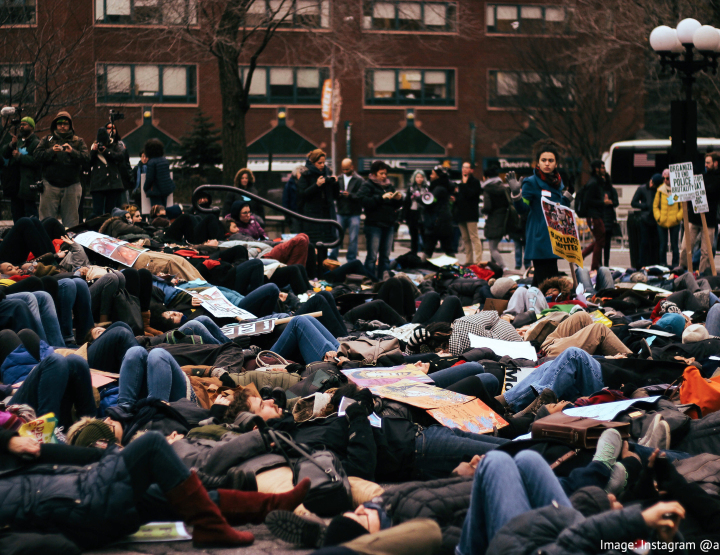Exciting news just in – The Sun newspaper has taken its first baby step towards removing the outdated, sexist, narrow-minded, patriarchy-perpetuating “institution” that is Page 3.
In what can only be described as an incredibly minor achievement on a still-long road to victory, as of this week the paper will clad its Page 3 models in bras and bikini tops. Sadly, this was a pretty clever move on their part; is it a victory, is it not? Should we be happy, should we be disappointed? It’s not the total disappearance of this hideously backwards tradition, but it’s certainly preferable to bare breasts in a national family newspaper.
Still: I’m going to view it as a moderate victory. But what has saddened me are the number of people who’ve escaped from the woodwork in support of Page 3. It’s not even been annihilated – just asked to shuffle grudgingly, but barely, into line with the 21st century – but a shocking wave of ignorance washed over social media, seemingly misunderstanding the very concept of the campaign.
Here are a few notes on the most common arguments against the campaign. Tweets are randomly selected, but sadly representative.
So people are trying to ban page3, if you don’t like it don’t look it’s not hard to skip a page ! Are people turning into prudes in 2015!
— Mya Milan (@MilanMya) January 21, 2015
This has been covered before but let’s make it perfectly clear: the campaign is not asking for a ban. It’s calling for the Sun to understand how the images undermine women as people, objectify them, pit pictures of women looking pretty against men doing stuff, and then voluntarily remove those images. Sadly the Sun haven’t understood any of the objectification issues, but hey, that’s why we won’t stop campaigning. As for the incredibly overused “Don’t like it, don’t look” argument, that’s a) not always an option (see here for examples of how it’s affected people who’ve never bought the paper) and b) encourages members of society who see something inherently wrong and dangerous to simply look the other way. Isn’t that phenomenally selfish? Is that really the attitude we want to instill in our children? “Oh yes darling, that man’s wanking on the bus. You don’t like it? Just look out the window instead”.
I know…lets get rid of nudity in films next! And then we’ll knock public breastfeeding on the head too #page3
— Louis Dasilva (@loudasilva) January 20, 2015
We don’t hate nudity. We like breasts. Many of us have some ourselves. We object to those breasts in a national family newspaper – the clue being in the word “news”. Are boobs news? If not, why are they in a newspaper?
Hang on… did we just censor a newspaper??? Free speech eh? #page3
— Jonathan Stephen (@TheHudsonLives) January 21, 2015
We aren’t against free speech. In fact, we are all indulging our right to free speech by joining this campaign and arguing against the existence of Page 3. This is free speech in action. We don’t want it to be banned (see above), and now that the Sun has taken one (very, very small) step along the road, they too have indulged in their right to free speech by choosing to publish photographs of bikini-clad models on their pages. They to are free to print what they want.
I too am a “Feminist” .. If a grown woman wants to go down the Glamour path, who am i to critisize/mock. Embrace your body – I do! #page3
— BLONDIE (@BlondieJanner) January 20, 2015
I can’t tell another person what to think or feel, and I’m happy this woman considers herself a feminist. However, I wonder whether she’s considered the underlying causes, meanings, and repercussions of Page 3. If any of the NMP3 supporters criticise or mock topless models then that is absolutely at odds with the ethos of the campaign. I want women to embrace their bodies; but alongside their achievements, ambitions, sporting successes, business acumen, educational results; all of the things that men are praised for in the same newspaper, whilst women exist merely to be ogled at.
At least #page3 promoted a healthy body image and gave confidence to thousands of young women. But the culture of offence didn’t like that.
— James Walker-Frase (@secularistjim) January 20, 2015
Body confidence, sure: for a tiny section of the population. Every Page 3 girl is slim with big  breasts, young, and white. This sends the message that one can’t be black or plus-sized or small-boobed or over 25 to be deemed attractive – otherwise surely women with those attributes would also be featured? Equally, what about the considerable numbers of men who support this campaign for any number of reasons, amongst them “I don’t want to be told what I should find attractive”? Why can’t we embrace diversity and indeed celebrate the female body for its many, many variations, sending a true healthy body image to all women, not just those who fit the narrow, prescriptive margins so helpfully defined by the Sun? Isn’t that being truly body-positive?
breasts, young, and white. This sends the message that one can’t be black or plus-sized or small-boobed or over 25 to be deemed attractive – otherwise surely women with those attributes would also be featured? Equally, what about the considerable numbers of men who support this campaign for any number of reasons, amongst them “I don’t want to be told what I should find attractive”? Why can’t we embrace diversity and indeed celebrate the female body for its many, many variations, sending a true healthy body image to all women, not just those who fit the narrow, prescriptive margins so helpfully defined by the Sun? Isn’t that being truly body-positive?
@c4news #Page3: the very same feminazis who championed free speech for #JeSuisCharlie, have none for #JeSuisPage3. Hypocrits!
—  Persistent Pete (@PPete_En) January 20, 2015
Persistent Pete (@PPete_En) January 20, 2015
Unlike last week’s fanatical extremists, Lucy Ann Holmes and her cohorts started an online petition rather than shooting David Dinsmore in the face. They embraced legal, ethical and socially-acceptable means to spread the word about an activity they found went against their feminist principles. And now, they’ve (sort of) won. The British press is still 100% free. No laws were passed, and crucially, nobody died. The similarities are non-existent.
I think it’s so sad that #page3 is over! Can’t believe people are rejoicing people loosing their jobs! Any other job and people would feel
— Porchia Watson (@Porchiaxx) January 20, 2015
I have no issue with women who choose glamour modelling as their career. I’m a feminist: full power to them and their choices. Luckily, they won’t be out of a job, for one fundamental reason. Each model has one photo, I don’t know – every year? Perhaps a few times annually? If anyone is seriously suggesting that this pays 12 months living wage then hell, where do I sign up? But evidently this is not the case. Modelling for Page 3 is one tiny element of their annual income, which is either supported by something really quite mundane, or topless modelling for any number of the porn magazines, websites, films etc which are still in circulation and will continue hiring. There is absolutely nobody in this world whose financial livelihood depends in its entirety on the existence of Page 3. (Another obvious point, but one which apparently needs to be made nonetheless is that they’re still hiring models at this stage, unfortunately, just models with bras on. So it really depends whether these women are simply desperate to pose with their breasts out – in which case, see aforementioned magazines/websites/films – or if they merely want to be on Page 3 of the Sun – in which case, buy a bikini and carry on).
Personally i think #page3 ban is rubbish. No different from #TorsoOfTheWeek the mags do. Don’t see people campaigning to have that shut down
— Lewis Bloor (@lewis_bloor) January 21, 2015
Again, not a ban (see above). Most pertinently: we are not against nudity. I like nudity. I like it in context, though. Do I find the Heat Torso of the Week objectifying? Well yes, I do. But we might also tackle the issue that women are predominantly viewed as sex objects whereas men are coming from a position of being appreciated for what they do, not how they look, and therefore the occasional (and it really is occasional) objectification of men simply cannot be put into the same category as that of women. But that’s a complicated issue and long debate for another day.
In addition, if Lewis feels so strongly about Heat Torso of the Week then there is absolutely nothing to stop him from starting his own petition, and I’m sure many members of No More Page 3 will happily sign up. For the moment, we’re focussing our attentions on what we consider to be one far more pernicious area of popular culture. But if you want to pour your time, care and attention into another overlooked area of objectification then you crack on, my friend, crack on.
If feminists really want to do something for women instead of worrying about #page3 surely better to campaign against #FGM?
— Mark Claflin (@markclaflin) January 20, 2015
FGM is horrific. As is domestic violence, rape, the pay gap, and any other number of issues that feminists fight. It is possible to be concerned simultaneously about more than one issue. It’s also possible to understand that the slow drip-drip-drip of sexism, misinformation and body-shaming which Page 3 perpetuates is representative of the everyday sexism which wears down our resistance and makes it ok for women to be treated as objects . . . and, at the other end of the wedge, as victims of FGM, rape, and domestic violence. No, Page 3 doesn’t cause these, but it sure as hell doesn’t help to raise women’s standing in the world, and increase the likelihood of these far more major issues being tackled and fixed.
Start with what you can fix in the world. That’s what Lucy Ann Holmes did, and I support her every step of the way.
There are countless other mindless oppositions to the No More Page 3 campaign but most have been answered very intelligently on the No More Page 3 FAQs. There are some excellent points in this round-up of responses by feminist writers in the Guardian (although I’d avoid the comments unless you want to despair for humanity).
If you’re opposed to the No More Page 3 campaign for reasons not discussed here, then I would be interested to hear why in the comments.
[This post originally appeared on Robyn’s blog, Bells & Whistles]






Leave a reply